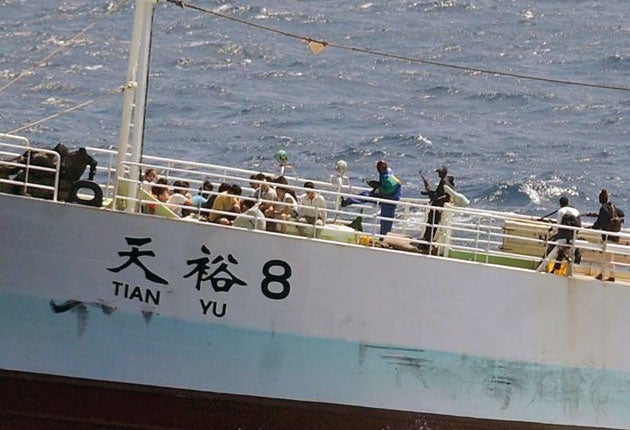Somali port awaits its $100m bounty
Pirates hold world's largest oil producer to ransom

The most spectacular prize in maritime history was anchored off Somalia last night with a rag-tag army of pirates holding the world's largest oil producer to ransom.
Despite a day of loud condemnation from international leaders and a multinational fleet of warships on patrol, the pirates showed they were able to strike at will by seizing two more vessels while the hijacked Saudi supertanker was parked off Haradheere on the Somali coast.
A Hong Kong-flagged tanker, FV Tian Yu 8, carrying wheat to Iran was taken in the Gulf of Aden and a fishing vessel flying the Kiribati flag of convenience was also seized, mocking Nato's attempts to police the coast.
Lt Nathan Christensen, from the US Fifth Fleet in Bahrain, said: "I can confirm that the ship is anchored near the city of Haradheere. We haven't had any communication with the pirates so that's the most we can say."
As the ramifications of the largest hijacking ever, 420 nautical miles off Somalia sank in, the international community scrambled to meet the new threat. The Saudi Foreign Minister Prince Saud al-Faisal compared the pirates to "terrorists" and said his country would throw its weight behind a European-led initiative to step up security in the affected shipping lanes.
"This outrageous act by the pirates, I think, will only reinforce the resolve of the countries of the Red Sea and internationally to fight piracy," he said.
The US-led Nato mission has so far been unable to stop the surge in piracy. The owners of the Saudi tanker, the oil giants Aramco, said they were in talks with the pirates and had been assured that the 25 crew, including two Britons, were safe.
Witnesses in the port city of Eyl further up the coast – originally believed to be the final destination for the tanker carrying $100m (£67m) of crude oil – said there were increasing fears in the town of reprisals. People in the port in the breakaway region of Puntland said people were braced for an attack on what is now seen internationally as the pirates' base after the hijacking of two ships in quick succession.
Bile Wadani, a pirate who claimed to be in contact with others aboard the Sirius Star, said men were getting ready to relieve the hijackers aboard the 332m behemoth carrying two million barrels of oil, ahead of what is expected to be a protracted ransom negotiation.
A Ukrainian-flagged vessel transporting tanks and other heavy arms was taken nearly two months ago and is still being held with a large ransom under discussion. While individual owners have refused to comment on payments made to release their vessels, cargo and crew, Somali sources say that up to $2m is the going rate from the pirates. Some $30m is reported to have been paid to the pirates this year alone.
Speaking last night by telephone from Eyl last night, Mr Wadani said: "We are able to monitor their movements and move around them [foreign navies]. We know where they are before we decide to move."
The audacious nature of the attack on the Sirius, far beyond the coastal waters of Somalia and even the Gulf of Aden where attacks have been concentrated, has caught international authorities by surprise. Pictures of the pirates in action show small groups of young men armed with automatic weapons and rocket-propelled grenades. Many security analysts had assumed prior to the seizure of the Sirius that the high-sided vessels plying the routes far out to sea would be beyond their reach.
The attacks have usually been conducted from speedboats by small groups who fire shots and, in some cases, grenades across the bridge of ships to force the captain to surrender.
The long-range hijacking described by the US Fifth Fleet as a "fundamental change" in the pirates' tactics has revived fears that they are operating from a larger vessel, from where they launch the smaller attack boats.
Mohamed Wali, another pirate speaking from Eyl, said his colleagues had used speedboats in the Sirius attack but refused to say how many hijackers there had been and where the boats had been launched from.
Andrew Mwangura, co-ordinator of the East African Seafarers' Association, said he thought a hijacked Nigerian tug was the "mothership" for the supertanker seizure. The fully-loaded ship was probably low in the water and therefore easy to board, he said.
As the pirates seized more ships yesterday the country's "transitional government" had to be threatened by regional leaders with targeted sanctions as they continued to refuse to agree on forming a cabinet. The government controls only a fraction of its own territories and would collapse immediately without an Ethiopian occupying force and UN troops from Uganda. Kenya yesterday offered to send a fresh battalion to reinforce the UN mission.
Subscribe to Independent Premium to bookmark this article
Want to bookmark your favourite articles and stories to read or reference later? Start your Independent Premium subscription today.

Join our commenting forum
Join thought-provoking conversations, follow other Independent readers and see their replies